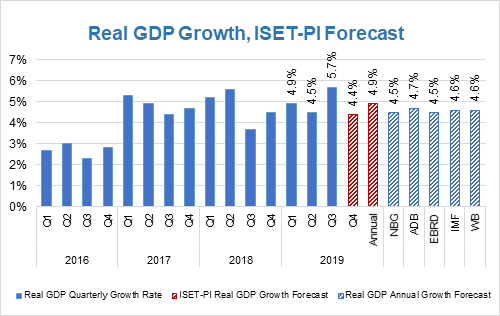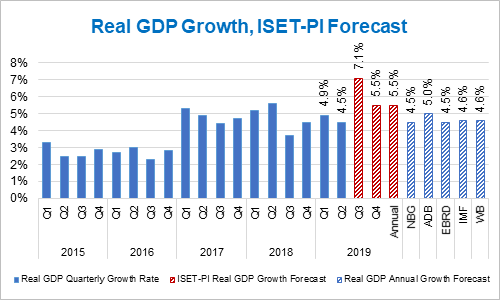- Details
According to the preliminary statistics released by GeoStat, Georgia’s real GDP growth constituted 5.7% year over year (y/y) in Q3 2019. As a result, estimated real GDP growth for the first nine months of 2019 amounted to 5.0%, which is above the National Bank of Georgia’s (NBG) growth forecast for 2019 (the forecast remained unchanged at 4.5%). Meanwhile, based on September’s data, ISET-PI expects annual growth in 2019 to be 4.9%.
The economic growth in Q3 2019 was driven by increased external demand, which stimulated net exports of goods and services, and strong fiscal stimulus. A rise in remittances also positively affected the economy, while lower revenues from international travellers caused by the Russian ban on air travel to Georgia hindered economic growth in the reported period. Data on foreign direct investment (FDI) for Q3 is not available yet. However, we expect the negative trend in FDI to continue in the second half of the year. Furthermore, lower inflows of foreign currency from tourism and FDI caused the recent depreciation of the lari against the currencies of major trading partners, resulting in increased prices of imported products, and a higher inflation rate.
- Details
According to the preliminary statistics released by GeoStat, Georgia’s real GDP growth was 4.5% year over year (y/y) in Q2 2019, which fell slightly below the 4.8% growth predicted by ISET-PI’s GDP forecast from July. As economic growth constituted 4.9% y/y in Q1, the Georgian government’s 4.5% target of real GDP growth for 2019 does not seem overambitious.
The economic growth in Q2 2019 was mostly driven by stronger external demand, which stimulated net exports of goods and services. Raised remittances also positively affected the economy, however, an extremely low level of foreign direct investment (FDI) drove down GDP growth in the reported quarter. Accelerated fiscal spending, moderate growth of credit activity, and consumption were the internal drivers of growth, while deteriorated business sentiments and a decreased level of investment hindered economic growth in the second quarter.












